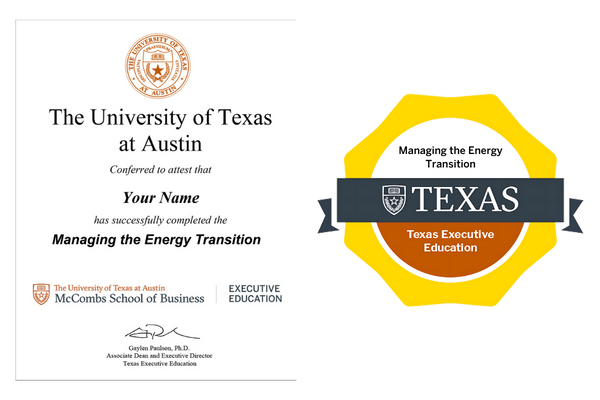
Managing the Energy Transition
IMPLEMENT SUSTAINABLE ENERGY SOLUTIONS
Pressing climate change concerns and geopolitical tensions have accelerated the urgency to embrace cleaner energy alternatives over conventional energy sources. To tackle this change, organizations are looking toward professionals with strong leadership skills who can effectively collaborate with stakeholders to steer through challenges. Energy leaders need to be proficient at navigating complex regulatory frameworks while assessing the economics of different renewable energy sources.
The Managing the Energy Transition program from Texas Executive Education at the McCombs School of Business is designed by expert faculty with global, cross-industry experience and active involvement in the debates and policymaking in the energy sector. Through a combination of expert insights, application-based activities, case studies, and peer learning, the six-week curriculum empowers professionals to manage trade-offs and make informed decisions as they drive their organizations toward an efficient and equitable energy transition.
UT AUSTIN: A LEADER IN ENERGY RESEARCH AND EDUCATION
The state of Texas has developed abundant renewable energy resources, generating more than a quarter of the nation’s electricity from wind power, and is a leader in solar energy production. The University of Texas at Austin (UT Austin) is core to this success and is the nation’s number-one energy research university. Its future-thinking faculty champion collaboration and innovation. Over 20 energy centers and programs, at UT Austin facilitate an integrated, systems-oriented approach to meeting the energy challenges of today and the future.
UT Austin’s Energy Institute has funded more than US$300 million in energy research on a broad spectrum of issues. It is also home to the KBH Energy Initiative, a preeminent energy center at the intersection of energy business, law, and policy. This diverse research footprint is pioneering novel ways to enable energy sustainability. UT Austin has the largest alumni network of energy professionals in the nation and has contributed almost 14% of the US talent pool currently working in the energy sector.
WHAT YOU WILL LEARN
The Managing the Energy Transition program will enable you to:
Define drivers and impacts of energy transition, including scientific evidence market forces, policy, risk, and geopolitical shocks.
Compare the cost, reliability, and cleanliness of net-zero technologies to assess uncertainty and trade-offs in the context of the transition.
Identify economic trade-offs between the impact of climate change and the macroeconomic cost of decarbonization.
Analyze the effectiveness and impact on cost due to impacts of regulatory policy choices for achieving net- zero goals.
Examine scenario analysis planning in making informed decisions and mitigating risk in the energy transition.
Provide strategic recommendations for navigating change in today’s energy markets.

PhD, The Rex G. Baker Centennial Chair in Natural Resources Law, University of Texas School of Law; Professor of Business, Government and Society, McCombs School of Business
"As the energy sector moves towards net zero, organizations face the challenge of balancing the urgency to decarbonize with the practicalities of effectively integrating gr...
WHO IS IT FOR?
The program is ideal for business leaders and senior professionals in the energy industry who are:
Keen to understand the drivers, trade-offs, and policy choices associated with energy transition in order to align organizational energy strategies with sustainability goals
Seeking tools and techniques to drive operational excellence, adopt new technologies, and maximize profitability
Looking to stay abreast of emerging trends and complex regulatory requirements to guide organizations toward policy compliance
Interested in exploring various policy approaches for reducing carbon emissions while balancing economic considerations with environmental goals
CURRICULUM
The six-week program delves into the scientific and political forces driving energy transition as well as the financial and environmental trade-offs that need to be addressed. The curriculum, organized into weekly modules, offers flexibility in accessing program materials. Weekly activities, including faculty lectures, case studies, and real-world scenarios, equip participants with practical tools to manage scenario planning and decision making.
Understand the institutional structure of energy markets and the risks and opportunities created by different energy market designs. Consider the scientific and political forces driving energy transition and explore some of the prevailing models of a low-carbon future.
Dive into the politics of energy policymaking and why certain changes take more time than others. Understand financial and environmental trade-offs and their implications for energy transition goals.
In this module, we will discuss the macroeconomic costs of decarbonization as well as the social cost of carbon while understanding how restructuring the energy market has near- and long-term impacts.
Explore various policy approaches toward energy transition — including taxes, cap and trade, standards, and subsidies — and their cost-effectiveness. Analyze the long-term costs and distributional impacts of decarbonization policies.
Examine why scenario planning is an essential step in developing business strategies and tactics that may be impacted by energy transition. Explore how it can help identify the risks and opportunities as well as potential alternatives that can be analyzed in the context of different scenarios.
Understand why energy transition requires you to weigh profitability, cost, and other objectives as well as measure the alternative outcomes. In this module, you will explore how utility theory can be used to make decisions with multiple objectives.
KEY PROGRAM FEATURES

Expert Faculty
Gain in-depth insights from world-renowned faculty who are also expert practitioners with long-standing industry experience.

Peer Learning
Interact and share insights with like-minded business leaders in the energy industry from around the world.

Real-World Examples
Draw on the broad expertise of faculty and on proprietary frameworks and use cases from across the entire energy ecosystem, all of which serve to make your learnings holistic.

Energy Transition Playbook
Create a resourceful playbook by applying program learnings to your organization’s challenges in navigating the path to net zero.

Weekly Office Hours
Join optional live weekly office hours with a program leader to deepen your understanding and clarify your questions.
Certificate of Completion
Earn a certificate of completion from The University of Texas at Austin, McCombs School of Business, a leader in energy research and education.
MEET THE FACULTY

The Rex G. Baker Centennial Chair in Natural Resources Law, University of Texas School of Law; Professor of Business, Government and Society, McCombs School of Business
David Spence focuses his research and teaching on business–government relations and the regulation of business, particularly energy and environmental regulation. Spence has ta...

Professor of Public Affairs, UT Austin
Sheila Olmstead is a professor at the Lyndon B. Johnson School of Public Affairs at UT Austin, a visiting fellow at Resources for the Future in Washington, DC, and a senior fe...

Professor of Information, Risk and Operations Management; the Fondren Foundation Centennial Chair in Business, the McCombs School of Business at UT Austin
James Dyer’s research and teaching interests include risk management, multiple-criteria decision making, and capital budgeting. He has won multiple academic awards, including ...

CERTIFICATE
Upon successful completion of the program, participants will be awarded a certificate and a digital badge from the University of Texas at Austin, McCombs School of Business.
After successful completion of this program, your digital certificate will be emailed to you in the name you used when registering for the program. All certificate images are for illustrative purposes only and may be subject to change at the discretion of the University of Texas at Austin.
Note: This program does not grant academic credit or a degree from The McCombs School of Business.
FAQs
How do I know if this program is right for me?
After reviewing the information on the program landing page, we recommend you submit the short form above to gain access to the program brochure, which includes more in-depth information. If you still have questions on whether this program is a good fit for you, please email learner.success@emeritus.org, and a dedicated program advisor will follow-up with you very shortly.
Are there any prerequisites for this program?
Some programs do have prerequisites, particularly the more technical ones. This information will be noted on the program landing page, as well as in the program brochure. If you are uncertain about program prerequisites and your capabilities, please email us at the ID mentioned above.
Note that, unless otherwise stated on the program web page, all programs are taught in English and proficiency in English is required.
What is the typical class profile?
More than 50 percent of our participants are from outside the United States. Class profiles vary from one cohort to the next, but, generally, our online certificates draw a highly diverse audience in terms of professional experience, industry, and geography — leading to a very rich peer learning and networking experience.
What other dates will this program be offered in the future?
Check back to this program web page or email us to inquire if future program dates or the timeline for future offerings have been confirmed yet.
How much time is required each week?
Each program includes an estimated learner effort per week. This is referenced at the top of the program landing page under the Duration section, as well as in the program brochure, which you can obtain by submitting the short form at the top of this web page.
How will my time be spent?
We have designed this program to fit into your current working life as efficiently as possible. Time will be spent among a variety of activities including:
Engaging with recorded video lectures from faculty
Attending webinars and office hours, as per the specific program schedule
Reading or engaging with examples of core topics
Completing knowledge checks/quizzes and required activities
Engaging in moderated discussion groups with your peers
Completing your final project, if required
The program is designed to be highly interactive while also allowing time for self-reflection and to demonstrate an understanding of the core topics through various active learning exercises. Please email us if you need further clarification on program activities.
What is it like to learn online with the learning collaborator, Emeritus?
More than 300,000 learners across 200 countries have chosen to advance their skills with Emeritus and its educational learning partners. In fact, 90 percent of the respondents of a recent survey across all our programs said that their learning outcomes were met or exceeded. All the contents of the course would be made available to students at the commencement of the course. However, to ensure the program delivers the desired learning outcomes the students may appoint Emeritus to manage the delivery of the program in a cohort-based manner the cost of which is already included in the overall course fee of the course. A dedicated program support team is available 24/5 (Monday to Friday) to answer questions about the learning platform, technical issues, or anything else that may affect your learning experience.
How do I interact with other program participants?
Peer learning adds substantially to the overall learning experience and is an important part of the program. You can connect and communicate with other participants through our learning platform.
What are the requirements to earn the certificate?
Each program includes an estimated learner effort per week, so you can gauge what will be required before you enroll. This is referenced at the top of the program landing page under the Duration section, as well as in the program brochure, which you can obtain by submitting the short form at the top of this web page. All programs are designed to fit into your working life. This program is scored as a pass or no-pass; participants must complete the required activities to pass and obtain the certificate of completion. Some programs include a final project submission or other assignments to obtain passing status. This information will be noted in the program brochure. Please email us if you need further clarification on any specific program requirements.
What type of certificate will I receive?
Upon successful completion of the program, you will receive a smart digital certificate. The smart digital certificate can be shared with friends, family, schools, or potential employers. You can use it on your cover letter, resume, and/or display it on your LinkedIn profile. The digital certificate will be sent approximately two weeks after the program, once grading is complete.
Can I get the hard copy of the certificate?
No, only verified digital certificates will be issued upon successful completion. This allows you to share your credentials on social platforms such as LinkedIn, Facebook, and Twitter.
Do I receive alumni status after completing this program?
No, there is no alumni status granted for this program. In some cases, there are credits that count toward a higher level of certification. This information will be clearly noted in the program brochure.
How long will I have access to the learning materials?
You will have access to the online learning platform and all the videos and program materials for 12 months following the program start date. Access to the learning platform is restricted to registered participants per the terms of agreement.
What equipment or technical requirements are there for this program?
Participants will need the latest version of their preferred browser to access the learning platform. In addition, Microsoft Office and a PDF viewer are required to access documents, spreadsheets, presentations, PDF files, and transcripts.
Do I need to be online to access the program content?
Yes, the learning platform is accessed via the internet, and video content is not available for download. However, you can download files of video transcripts, assignment templates, readings, etc. For maximum flexibility, you can access program content from a desktop, laptop, tablet, or mobile device.
Video lectures must be streamed via the internet, and any livestream webinars and office hours will require an internet connection. However, these sessions are always recorded, so you may view them later.
Can I still register if the registration deadline has passed?
Yes, you can register up until seven days past the published start date of the program without missing any of the core program material or learnings.
What is the program fee, and what forms of payment do you accept?
The program fee is noted at the top of this program web page and usually referenced in the program brochure as well.
Flexible payment options are available (see details below as well as at the top of this program web page next to FEE).
Tuition assistance is available for participants who qualify. Please email
What if I don’t have a credit card? Is there another method of payment accepted?
Yes, you can do the bank remittance in the program currency via wire transfer or debit card. Please contact your program advisor, or email us for details.
I was not able to use the discount code provided. Can you help?
Yes! Please email us with the details of the program you are interested in, and we will assist you.
How can I obtain an invoice for payment?
Please email us your invoicing requirements and the specific program you’re interested in enrolling in.
Is there an option to make flexible payments for this program?
Yes, the flexible payment option allows a participant to pay the program fee in installments. This option is made available on the payment page and should be selected before submitting the payment.
How can I obtain a W9 form?
Please connect with us via email for assistance.
Who will be collecting the payment for the program?
Emeritus collects all program payments, provides learner enrollment and program support, and manages learning platform services.
Are there any restrictions on the types of funding that can be used to pay for the program?
Program fees for Emeritus programs with Texas Executive Education at the McCombs School of Business may not be paid for with (a) funds from the GI Bill, the Post-9/11 Educational Assistance Act of 2008, or similar types of military education funding benefits or (b) Title IV financial aid funds.
What is the program refund and deferral policy?
For the program refund and deferral policy, please click the link here.
Didn’t find what you were looking for? Write to us at learner.success@emeritus.org or Schedule a call with one of our Program Advisors or call us at +1 361 344 4980 (US) / +44 138 443 7887 (UK) / +65 3138 4361 (SG)
Flexible payment options available.
Starts On
